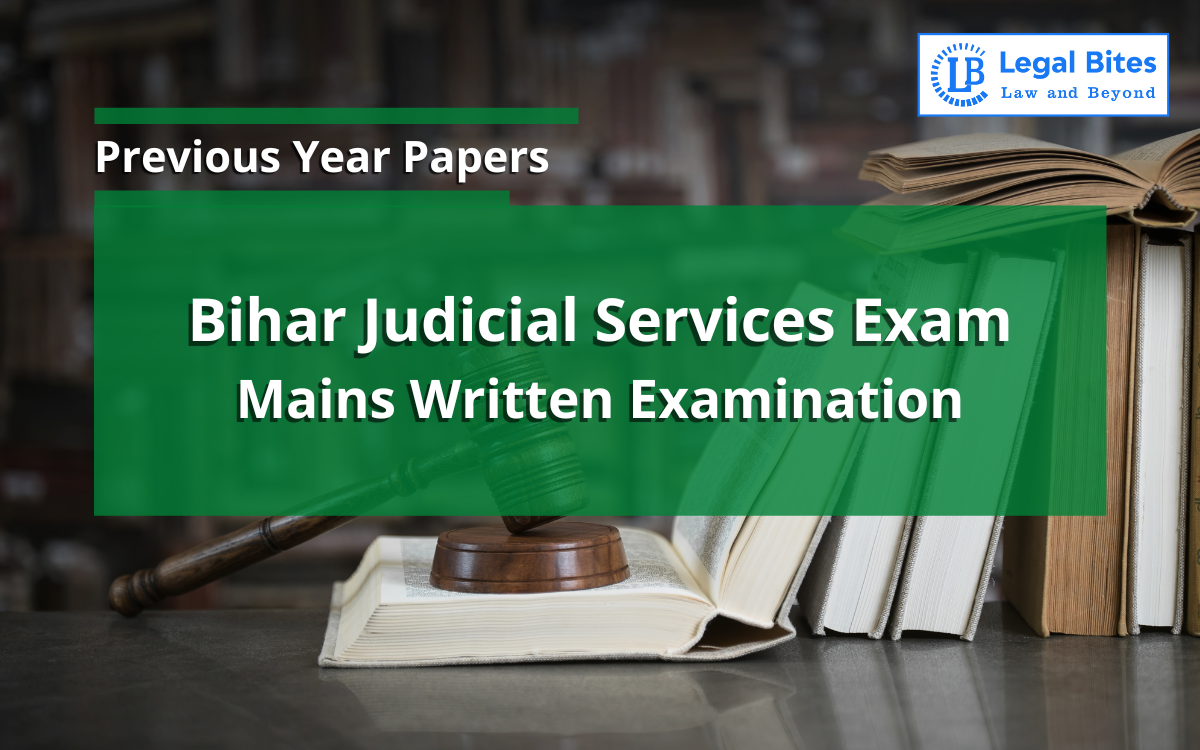Bihar Judicial Services Exam Mains 2018 Previous Year Paper (Commercial Law)
Candidates preparing for Bihar Judicial Services Exam should solve the Bihar Judicial Services Exam Mains 2018 (Commercial Law).;

Candidates preparing for Bihar Judicial Services Exam should solve the Bihar Judicial Services Exam Mains 2018 (Commercial Law) and other previous year question papers before they face Prelims and Mains.
It also gives an idea about the syllabus and how to prepare the subjects by keeping the previous year's questions in mind. All toppers are mindful and cognizant of the types of questions asked by the BJS, to be aware of the various tricks and types of questions. This should be done by every aspirant when starting their preparation. It is very important to have an overall understanding of the pattern and design of questions.
Bihar Judicial Services Exam Mains 2018 Previous Year Paper (Commercial Law)
Only practising the authentic question papers will give you a real feel of the pattern and style of the questions. Here's Bihar Judicial Services Exam Mains 2018 Previous Year Paper (Commercial Law).
Bihar Judicial Services Mains Written Examination 2018
Commercial Law
Commercial Law
Paper: Commercial Law
Time: 3 Hours
Maximum Marks: 150
Note: Marks are indicated against each question
Answer six questions, taking at least one from each Group.
Group - A
(Sale of Goods Act)
Question 1
(a) Make distinction between a 'Hire-Purchase Agreement' and an 'Agreement for Hire'.
A hires a sewing machine agreeing to pay a fixed amount of rent for the use of the machine, with a stipulation that in case A were to pay a certain amount in cash at anytime during the hire, he could become the purchaser of the machine provided he had regularly paid the rent. Analyse the nature of the agreement. [10 Marks]
(b) Discuss the 'doctrine of caveat emptor'. Does the Indian law recognise this doctrine? If so, to what extent? [15 Marks]
Question 2
(a) "Risk prima facie passes with the property". Discuss this principle and explain the exceptions, if any, to this principle. [15 Marks]
(b) B offers to buy A's horse for Rs 1.000/-. The horse is to be delivered to B on a stated day and the price is to be paid on another stated day. A accepts the offer. When does the horse become B's property? Reply it with reasons referring the relevant provisions of the Sale of Goods Act. [10 Marks]
Group - B
(Negotiable Instruments Act)
Question 3
(a) What do you understand by 'Promissory Note" and 'Bill of Exchange'? Explain their characteristics and make a distinction between them. [10+5=15 Marks]
(b) Examine the various modes of discharge from liability on Negotiable Instruments. [10 Marks]
Question 4
(a)What happens when there is a material alteration of a Negotiable Instrument? Discuss and explain if there is any exception to the rule. What will be the consequences if holder of a bill alters the date of the instrument to accelerate the time of the payment? [10+5=15 Marks]
(b) Distinguish between 'transfer by negotiation' and 'transfer by agreement'.
Group - C
(Company Law)
Question 5
(a) How has the Companies Act, 2013 extended the ambit of company? How can a company be formed? [15 Marks]
(b) What do you mean by 'small company'? Explain its advantages and disadvantages. [10 Marks]
Question 6
(a) What do you mean by 'misstatement in prospectus'? Who is responsible for misstatement in prospectus? [10+5=15 Marks]
(b) If there is misstatement in prospectus, various remedies are available to the aggrieved persons. Discuss the remedies. [10 Marks]
Question 7
(a) What do you understand by the 'Principle of Supremacy of Major Rule?' Discuss in the light of relevant case law. [10 Marks]
(b) There are various exceptions to the 'Principle of Supremacy of Major Rule'. Discuss by citing relevant cases. [15 Marks]
Group - D
(Indian Partnership Act, 1932)
Question 8
(a) What do you mean by 'Sleeping Partner'? A, B and C are partners in a firm, whereby C is a sleeping partner for whom the ceditors are unaware. C retires from the firm without giving any public notice. Discuss the liability of C for debts of the firm incurred before and after retirement. [5+10 = 15 Marks]
(b) Define 'Partnership at Will'. How is it formed and wound up? [10 Marks]
Question 9
(a) "The Partnership Act does not have a provision for compulsory registration of the firm but there is pretty strong inspiratory pressure for the registration" Examine the authenticity of this statement pointing out the consequences for non-registration of the firm. [15 Marks]
(b) Discuss the grounds on which a firm may be dissolved by the Court at the suit of partner. [10 Marks]
Question 10
(a) What do you understand by 'Doctrine of Holding Out'? Explain and discuss its exceptions [15 Marks]
(b) What will be the consequences, if a minor is admitted to partnership? Discuss his rights and liabilities during his minority and after he has attained majority. [10 Marks]

